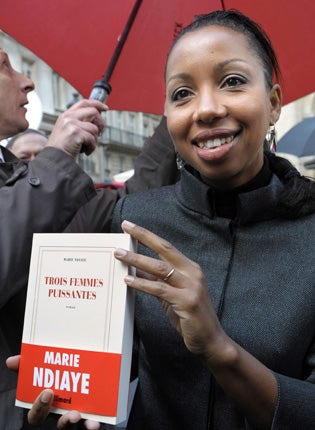First black female winner for France's top literary prize

Your support helps us to tell the story
From reproductive rights to climate change to Big Tech, The Independent is on the ground when the story is developing. Whether it's investigating the financials of Elon Musk's pro-Trump PAC or producing our latest documentary, 'The A Word', which shines a light on the American women fighting for reproductive rights, we know how important it is to parse out the facts from the messaging.
At such a critical moment in US history, we need reporters on the ground. Your donation allows us to keep sending journalists to speak to both sides of the story.
The Independent is trusted by Americans across the entire political spectrum. And unlike many other quality news outlets, we choose not to lock Americans out of our reporting and analysis with paywalls. We believe quality journalism should be available to everyone, paid for by those who can afford it.
Your support makes all the difference.The French-Senegalese writer Marie NDiaye yesterday became the first black woman to win the Prix Goncourt, France's most prestigious literary prize.
NDiaye called the prize, worth a nominal €10 but far more in prestige and additional sales, an "unexpected reward for 25 years of persistence". She had previously won France's Femina literary prize, which is awarded by a jury of women.
Her prize-winning book Three Strong Women is a moving account of the struggles of women in Europe and Africa. It tells the story of Norah, Fanta and Khadi's fight to "preserve their dignity in the face of humiliations that life has inflicted," according to her publisher Gallimard.
Norah is a French lawyer with roots in West Africa; Fanta is a Senegalese woman living in France; and Khadi is a young Senegalese woman who tries to immigrate illegally to Europe.
"They are in very difficult situations," NDiaye said in an interview with Mediapart news website. "[But] they have a hard inner core that is absolutely unbreakable."
NDiaye has written a dozen books, from novels to short-story collections and plays. Born in 1967 in Pithiviers, south of Paris, to a French mother and a Senegalese father, she now lives in Berlin. One of four authors whose books were up for the prize, she told France-2 television she was "very happy to be a female recipient of the Goncourt".
"I've been writing for 25 years, I'm no longer a beginner, so I have enough experience behind me to be able to take this all in with calm," she said.
The 105-year-old Prix Goncourt guarantees literary acclaim and high sales for the winning author. Past recipients include Marcel Proust, Simone de Beauvoir and Marguerite Duras.
Join our commenting forum
Join thought-provoking conversations, follow other Independent readers and see their replies
Comments